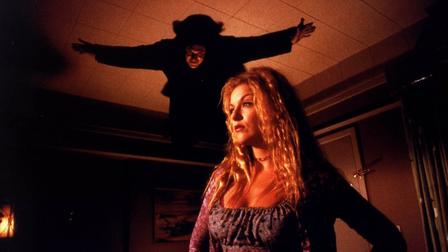#8 - Vampires
John Carpenter, 1998

A vampire hunter working on behalf of the Catholic Church must go up against an exceptionally powerful master vampire.
John Carpenter is a fan of Westerns, and while he's never technically directed one, many of his films draw inspiration from Westerns to one extent or another.
Escape From New York has an outlaw being forced to carry out a rescue for his freedom (and life),
Assault on Precinct 13 has police fending off a criminal siege in an explicit homage to
Rio Bravo, and even horrors like
Halloween play around with tropes like the lawman chasing the remorseless killer to a sleepy small town.
Vampires is one of his more obvious pseudo-Westerns with its dusty desert settings, slide-guitar score, and grizzled gunslinging leads. As you can probably guess, the key difference with this movie is the presence of vampires. Jack Crow (James Woods) is a lifelong vampire hunter who leads a squad of other hunters to clear out entire nests of vampires throughout the country - however, he faces his latest challenge when an all-new and unusually powerful vampire attacks his crew, leaving him with only his equally hardened partner (Daniel Baldwin), the naive young priest (Tim Guinee) who's been assigned by the Vatican to oversee their duties, and the recently-bitten call girl (Sheryl Lee) whose gradual transformation into a vampire is something that Crow is prepared to exploit in order to kill the master vampire once and for all.
In trying to make
Vampires a consciously subversive take on vampires and the people who hunt them, Carpenter instead crafts a straight example of the kind of mean-spirited machismo that his greatest films managed to either avoid or criticise. It makes sense that veteran vampire hunters would be reluctant to establish any long-term bonds or care about social graces, but here that manifests as Woods and Baldwin spitting alpha-male bile at both each other and at anyone else who comes into contact with them (especially Lee, whose put-upon characters bears the brunt of their callousness throughout the film). Even when the movie tries drawing attention to the wounded humanity underneath the leading duo's brutish exteriors (especially Crow's tragic backstory as a boy who was adopted by the church after his parents were attacked by vampires), the actors can't sell any of it nearly enough to make further plot-critical moments of character development seem remotely convincing. The concept of the Catholic Church not only being a worldwide support system for vampire hunters but also having its top vampire hunter be a foul-mouthed disbeliever is a novel one, but this is largely rendered as Crow engaging in grating odd-couple rapport with his much more pious and strait-laced minder. Meanwhile, Lee's character being infected with vampirism is a plot all its own as she can connect to the animalistic creatures' hive-mind at the risk of her own humanity, but this ends up being little more than fuel for a stunted relationship with Baldwin that is characterised less by their non-existent chemistry than by his uncomfortably rough treatment of her.
Vampires ultimately leans closer to being an action movie than a horror movie as it shows Crow and his team methodically rounding up vampires and killing them, often by hooking them up to a truck winch and dragging them out into the sunlight. However, this no-nonsense approach is not terribly exciting to watch as it starts off dully repetitive and remains that way even as later sequences start throwing in obstacles that try and fail to ratchet up tension. Even the gory carnage caused by vampire and hunter alike all come across as rejected leftovers from KNB's work on
From Dusk Till Dawn. To top it all off, Carpenter once again scores his own movie, but it amounts to little more than generic slide-guitar noodling. In that regard, it sums up the real tragedy of
Vampires - it may well be the closest Carpenter has come to making a straight Western, yet it's also a surprisingly serious contender for the worst movie he's ever made. Sure, there are more obviously boring and underwhelming contenders like
The Ward or
Ghosts of Mars, but for all their faults neither of them left me with quite as bad an aftertaste as
Vampires did. Perhaps the best summarisation of
Vampires comes from a line Crow delivers that highlights how the filthy and largely mindless vampires of its world are nothing like the fanciful aristocrats from stories like
Dracula. While this is intended to underline how much
Vampires works to distinguish itself from the trappings of its genre (especially when the title card is rendered as "John Carpenter's
Vampires" so as to emphasise the man's personal touch), it only serves as a stark reminder of how disappointingly it executes that approach.









